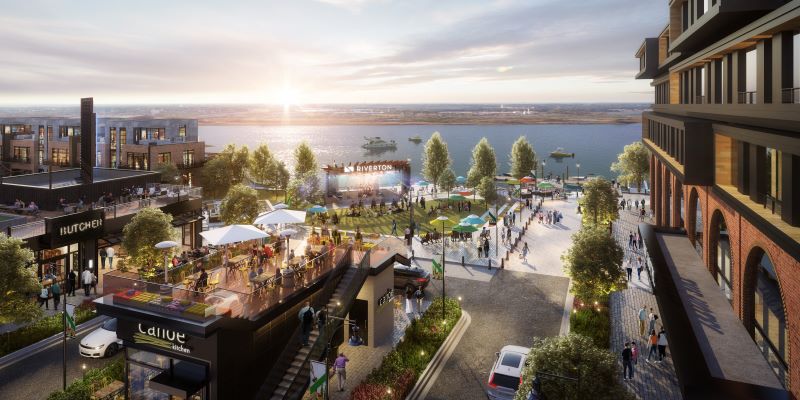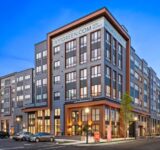The waterfront Riverton project in Sayreville is slated to create a 6.5 million-square-foot mixed-use development with about 1.3 million square feet of retail and entertainment space, 2 million square feet of office and other commercial space and some 2,000 residential units, which includes 300 affordable housing units. — Courtesy: North American Properties
By Joshua Burd
The state has approved a 10-year, $400 million tax credit award that will support key phases of Riverton, the massive project that could bring 6.5 million square feet of development to a once-contaminated, long-dormant waterfront property in Sayreville.
The allocation, which was formalized Thursday at the Economic Development Authority’s monthly board meeting, applies to a residential and commercial portion of the plan that comprises more than 2 million square feet, including 1,300 new residential units, 20 percent of which will be designated as affordable, the authority said. The award would translate to up to 50 percent of eligible projects costs and no more than $400 million, coming under the state’s Aspire program and specifically within the “transformative project” category.
That makes Riverton, which is being led by North American Properties, the first transformative project and the first project overall to be approved under the new Aspire rules that the EDA adopted in November.
“With today’s approval, Sayreville is poised to undergo a tremendous renaissance, which will bring new housing, jobs, retail and recreation that will benefit the entire community,” Gov. Phil Murphy said. “The Aspire Program continues to drive critical investments that support economic growth in communities across New Jersey.”
Planning for the $2.5 billion project, which would reclaim the 400-acre former National Lead site along the Raritan River, has quietly moved ahead in recent years since being taken over by North American Properties in 2018. The full scope could include some 2,000 residential units, 300 of which would be reserved as affordable housing, along with the largest single-level Bass Pro Shop as part of 1 million square feet of retail, restaurant and entertainment space, a waterfront promenade and several other uses.
The residential and commercial components that would benefit from Thursday’s EDA award represent some $1 billion in private investment, the authority said.
“We are very pleased to receive such strong support from the New Jersey Economic Development Authority with the board’s approval of the transformative Aspire development incentive award for Riverton,” said Kevin Polston, Riverton’s project executive. “We appreciate the vision of the Murphy administration and the New Jersey Legislature in creating the Aspire program, which will enable us to develop a new mixed-use waterfront community on a site left damaged by industry, delivering quality affordable housing, well-paying jobs for union trade labor, and new tax revenues, along with exciting retail and entertainment destinations and community amenities.
To date, the EDA’s board has approved a total of $694 million in Aspire awards for residential projects, which will create 1,800 housing units and $271 million for a commercial transformative project under the prior rules.
“Aspire’s flexible design had enabled us to support this long-anticipated project, which will transform a vast tract of land that had been rendered unusable many years ago, and once rehabilitated, in ways that will reinvigorate Sayreville, create jobs for the local community and improve quality of life for Riverton tenants and residents of nearby areas,” said Tim Sullivan, the authority’s CEO. “This is exactly the sort of thoughtful, impactful investment the Legislature and Governor Murphy hoped to attract when creating the Aspire program.”
Polston, meantime, cited the years of support from Sayreville borough officials and its Economic & Redevelopment Agency, Middlesex County and the state Department of Environmental Protection, as well as state lawmakers including state Sen. Joe Vitale, Assembly Speaker Craig Coughlin and Assemblywoman Yvonne Lopez.
“This truly has been a collaborative process to reclaim the land for long-term public benefit,” he said. “We are eager to move forward with the first phase of vertical construction in the new year.”
The EDA noted that the applicant, listed as Sayreville Seaport Associates Urban Renewal LP, is advancing at the culmination of a nearly 20-year effort to remediate the former industrial site. In addition to the residential units, which comprise more than 1.2 million square feet, the development will include nearly 800,000 square feet of commercial and retail space and a host of public amenities.
Those would include a public waterfront promenade, to which Sayreville residents and the general public will have access. The walkway will feature a Heroes Walk with exhibits and installations honoring Sayreville’s veterans, along with lighting, seating areas, gathering spaces, enhanced landscaping and an open-air amphitheater, as well as on-site spaces for municipal offices and two designated open-air performing arts venues.
“Today’s Aspire announcement is yet another example of how thoughtful economic development incentives can advance transformative projects that both improve our environment and lift our communities,” said Shawn M. LaTourette, the DEP’s commissioner. “This vast former industrial site will soon become a new hub of economic activity and point of community pride that reconnects the residents of Sayreville and Middlesex County with their Raritan River waterfront. My DEP colleagues and I congratulate the NJEDA on this important milestone and applaud Governor Murphy and our Legislature for the vision and leadership that will ensure the revitalize this brownfield site and others across the Garden State.”
EDA officials have noted with past approvals that Aspire, which was created by the New Jersey Economic Recovery Act of 2020, is a place-based economic development program to support mixed-use, transit-oriented development with tax credits to commercial and residential projects that have financing gaps. All residential Aspire projects must include at least 20 percent affordable housing, while applicants must certify that all commitments established at time of approval have been met before receiving their first disbursement of tax credits.
Applicants under Aspire are eligible to receive a percentage of the project’s eligible costs, subject to a cap that is determined by its location, other financing available and other aspects of the plan. The EDA recently updated the rules for the program to account for the spike in inflation and other rising costs, resulting in higher per-project caps that included changes to the “transformative project” category, in which proposals must demonstrate special economic importance to New Jersey and leverage the state’s mass transit assets, higher education assets and other economic development assets to attract or retain employers and skilled workers or in targeted industries by providing employment or housing.










